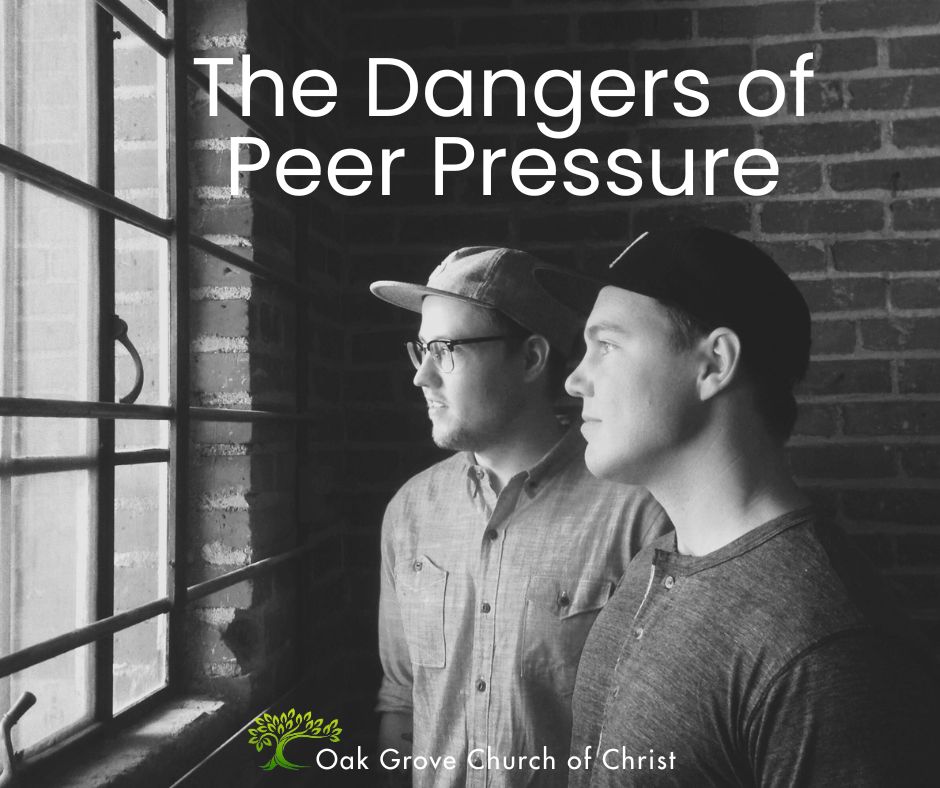
This morning and this evening, we’re going to be dealing with the topic of peer pressure. This morning, we will focus on the dangers of peer pressure, looking at what some of those dangers are. This evening, we’ll explore how we can keep from giving in to peer pressure and discuss things we can do to prevent it from being as much of a problem in our lives.
Peer pressure is something we all face. Most often, when we talk about peer pressure, we direct it toward young people because we think they’re so impressionable and easily misguided. That’s something we should address. However, you and I should not be so naive as to believe that only teenagers have to deal with peer pressure. In fact, it’s something all of us face.
There comes a time when we first realize we’re facing peer pressure, and it never goes away. We don’t outgrow peer pressure. We can’t outrun it. It’s something we have to deal with. Unfortunately, we don’t always talk about how to handle it. I hope you’ll come back tonight because that’s what we’ll discuss—how to deal with it. This morning, we’re going to focus on some of its dangers. I’m happy you’re all here.
What Is Peer Pressure?
Peer
According to Webster, a peer is “a person who has equal standing with another in status, class, or age.”
That’s true, but peer pressure can also cross some of those lines. For example, I can receive pressure from someone outside my age group—someone I respect who is older than I am could affect my judgment in some things. Even someone younger, outside my age group, might try to influence me. So, there aren’t hard and fast rules about who your peers are. In a stricter sense, though, your peers are those you equate as being equal with you.
Peer Pressure
I asked AI to define peer pressure from a scriptural standpoint, and you never know what you’re going to get, but I liked what it said. It defined peer pressure as “the influence exerted by others—especially one’s social group—to conform in attitude, speech, or behavior, often in opposition to one’s convictions, conscience, or obedience to God’s Word.” That’s not a bad definition.
Not all peer pressure is bad, though. Not all peer pressure is negative or tries to get us to fall away from God or do something we’re not supposed to do. We often talk about that kind of peer pressure because it’s what gets us in trouble when we give in to it. However, we can also exert positive peer pressure on our friends and family. When we talk about spiritual things, encourage people to attend worship services, offer to study with them, or pray for them, we’re exerting positive peer pressure. So, it’s not all bad—it doesn’t have to be.
This morning, as the title suggests, we’re focusing on The Dangers of Peer Pressure. We’ll look at what we commonly think of when we talk about peer pressure.
Before we move on, let me ask: Is it easier or harder to live a faithful Christian life when you’re constantly around those trying to live a faithful Christian life? It should be easier. Is it easier or harder when you’re constantly around those who don’t care about who Jesus is or why He came to this world, who don’t care about spiritual things? In most cases, it’s going to be harder because you have to stand, maybe not literally but spiritually, by yourself. It can be much harder. You’d better have your wits about you in that kind of environment. That’s not the environment we want to be in. We want to be where it’s easier to please God, where we find positive reinforcement or positive peer pressure.
Warnings Against Giving in to Peer Pressure
There are warnings in Scripture against giving in to peer pressure. Let’s look at a few key passages.
- Romans 12:2
Paul warns the Christians in Rome not to be conformed to the mold of the world. The world has an idea of what it wants from you, but you should not live like them. Don’t do what they’re doing or follow their ways. Instead, be transformed into the likeness of Jesus by the renewing of your mind. This passage warns us not to give in to the pressure from the world, from those outside the body of Christ.
- Galatians 1:10
Paul is saying that if he preaches only to receive the praise and glory of mankind, he’s not preaching to do God’s will. That puts him at odds with God because he’s trying to please his fellow man.
Giving in to peer pressure means doing something you know you shouldn’t, based on Scripture, just to please someone or fit into a particular group. We need to remember Paul’s words to the Galatians and be reminded that we should not live to please mankind but to serve God.
- Proverbs 1:10
If sinners try to get you to do something you know you’re not supposed to do, don’t do it. Don’t follow their ways. Understand that they’re not believing in God or following Him. God is not number one in their lives, so don’t follow what they want you to do.
We transform ourselves into the likeness of Jesus by the renewing of our mind, as Romans 12:2 says, focusing on what is good and perfect through the will of God.
Warning Against Causing One to Stumble through Peer Pressure
Not only are we warned against giving in to peer pressure, but we’re also warned against causing someone else to stumble. You and I could be guilty of exerting negative peer pressure on others.
- Matthew 18:1-7
You and I can be guilty of this woe if our actions or motivations cause someone to fall away or have doubts about God’s system of faith. We can be guilty of negative peer pressure if we engage in such behavior.
“No wickedness can be more deeply seated in the heart than that which attempts to mar the peace, defile the purity, and destroy the souls of others. And yet, in all ages, there have been multitudes who, by persecution, threats, arts, allurements, and persuasions, have endeavored to seduce Christians from the faith and to lead them into sin.” — Albert Barnes
Unfortunately, not all of those forces come from outside the church. We can be that negative influence on our fellow brothers and sisters in Christ, though we should not be.
There are warnings for us not to be stumbling blocks before our brethren or to place stumbling blocks in front of ourselves.
Evidence of Peer Pressure
Let’s spend the bulk of our time looking at some examples of those who gave in to peer pressure, the situations surrounding their actions, and the consequences.
- Exodus 32 – Aaron Building the Golden Calf
In Exodus 32, we read about Aaron building the golden calf. While Moses is on the mountain receiving the Ten Commandments and the law from God, the people grow impatient.
Verse 1 says, “And when the people saw that Moses delayed to come down out of the mount, the people gathered themselves together unto Aaron, and said unto him, Up, make us gods, which shall go before us; for as for this Moses, the man that brought us up out of the land of Egypt, we wot not what is become of him.”
They don’t know where Moses is or if he’s coming back, so they ask Aaron to make gods to lead them. This is one of the most foolish questions in Scripture. You’d think Aaron would have laughed them out of his tent and told them to wait for Moses.
But in verse 2, Aaron says, “Break off the golden earrings.” He doesn’t offer any resistance.
Aaron had been with Moses from before the children of Israel left Egypt. God sent Aaron to be Moses’ mouthpiece before Pharaoh, and Aaron witnessed the power of God in the plagues. Yet, when the people asked him to build gods, he didn’t resist. The result? God tells Moses, “Your people, which thou broughtest out of Egypt,” are doing things they shouldn’t.
Moses convinces God to turn from His wrath, but when Moses comes down, he sees them burning incense to these gods and breaks the stone tablets. Aaron’s excuse? “I don’t know what happened. We just put the gold in the pot, and out came these calves of gold.”
The consequence? Verse 28 says 3,000 people died, and Aaron had caused them to be naked and show their nakedness openly.
- 1 Samuel 15 – King Saul Spared King Agag
In 1 Samuel 15:24, Saul says to Samuel, “I have sinned: for I have transgressed the commandment of the Lord, and thy words: because I feared the people and obeyed their voice.” In verse 3, God commands Saul to utterly destroy the Amalekites because of their wickedness. Saul and his army defeat them, but he spares King Agag and the best of the sheep and cattle to offer sacrifices to God.
When Samuel meets Saul, Saul is proud, saying, “Look at what I’ve done for God.” But Samuel hears the sheep and sees King Agag alive. Saul claims he did what God told him, but he kept the king alive as a “present” to God and spared the animals because the people wanted them for sacrifices. Saul feared the people, not God. As a result, Samuel tells Saul that because of his disobedience, God will remove the throne from his family. No one from Saul’s family would be king over Israel again.
- Matthew 26:69-75 – Peter’s Allegiance
In Matthew 26:69-75, we read about Peter during Jesus’ trial. Peter follows at a distance and is in the outer courtroom area. A damsel asks, “Aren’t you one of those who was with Jesus?” Peter denies it. Another damsel asks the same, and Peter, indignant, says, “I don’t even know who the guy is.” Later, someone says, “Your speech betrays you; you’re from Galilee.” Peter denies it again. In verse 75, Peter remembers Jesus’ words: “Before the cock crow, thou shalt deny me thrice.”
Peter had opportunities to avoid fulfilling this prophecy. In John 13, Peter said he was ready to do anything for Jesus, even die for Him. Yet, hours later, out of fear for his safety, he denies knowing Jesus. He saw the unlawful circumstances of Jesus’ arrest and trial and feared receiving the same punishment.
- John 19:12-16 – Pilate Handing Over Jesus
In John 19:12-16, the Jews blackmail Pilate, saying, “If thou let this man go, thou art not Caesar’s friend.” If word got back to Caesar that Pilate thought himself above Caesar, Pilate’s life would be at risk. When Pilate tries to present Jesus as their king, the Jews reply, “We have no king but Caesar,” throwing Pilate under the bus. Fearing the people, Pilate hands Jesus over to be crucified.
Pilate places a plaque above the cross: “Jesus of Nazareth, King of the Jews.” When the Jews object, Pilate says, “What I have written, I have written,” as a way to spite them. According to Matthew’s account, Pilate tries to wash his hands of Jesus’ blood, but he’s not innocent because he had the opportunity to do good and didn’t.
Is Peer Pressure Keeping You Out of God’s Kingdom?
Is it possible that peer pressure has gotten to you? Maybe you’re not a member of the body of Christ. Is peer pressure keeping you outside the kingdom this morning? Are you influenced by those who say you don’t need to be part of a church or do anything to have your sins forgiven, claiming God has already determined that?
Is Peer Pressure Drawing You Away From God?
Maybe you’re a child of God, baptized to have your sins forgiven. Is it possible that peer pressure is drawing you away from God? Maybe your faith isn’t as strong as it should be, or there are things in your life that aren’t right, and you know it, but you haven’t done what’s necessary to make your life right with God. Seek the help of those in the church on your behalf.
One of these two situations may apply to you this morning. We want you to know the church is here to help. God wants you to understand, and Jesus wants you to know, there is a place for you at the foot of the cross. There’s room. Are you ready? If there’s anything we can do, we encourage you to contact us so we can discuss the saving love of Jesus.
Topics:
Peer Pressure



